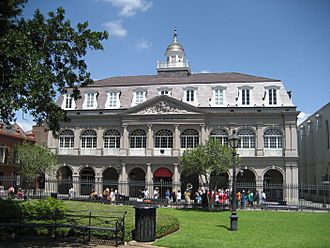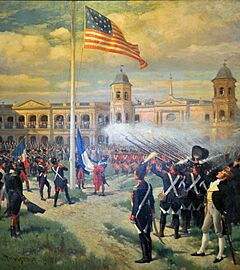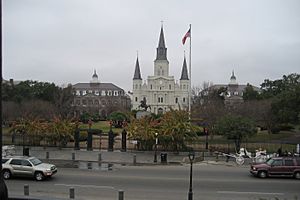The Cabildo facts for kids
Quick facts for kids The Cabildo |
|
|---|---|

The Cabildo has Spanish arches with a French mansard roof.
|
|
| General information | |
| Architectural style | Spanish Baroque; mansard roof and third floor in French-Revival |
| Location | 701 Chartres St., New Orleans, Louisiana |
| Construction started | 1795 |
| Completed | 1799 |
| Design and construction | |
| Architect | Gilberto Guillemard |
|
The Cabildo
|
|
|
U.S. National Historic Landmark District
Contributing Property |
|
| Part of | Vieux Carre Historic District (ID66000377) |
| NRHP reference No. | 66000373 |
| Significant dates | |
| Added to NRHP | October 15, 1966 |
| Designated NHL | October 9, 1960 |
| Designated NHLDCP | December 21, 1965 |
The Cabildo, originally called "Casa Capitular," is a very old and important building in New Orleans, Louisiana. It used to be the main office for the Spanish government when they ruled the city. Today, it's part of the Louisiana State Museum. You can find it right next to Jackson Square and the beautiful St. Louis Cathedral.
Contents
The Cabildo's Story
Early Days and Rebuilding
The first Cabildo building was sadly destroyed in the Great New Orleans Fire of 1788. This big fire happened in 1788. But don't worry, the building was rebuilt!
Workers started rebuilding it in 1795 and finished in 1799. The new building became the home for the Spanish city government in New Orleans. The name "Cabildo" comes from the "Illustrious Cabildo," which was the city council that met there.
Changes Over Time
In 1821, the Spanish symbol on the front of the building was replaced. An American eagle with cannonballs, made by an Italian artist named Pietro Cardelli, took its place. Later, in 1847, a third floor and a special sloped roof, called a mansard roof, were added. These additions were in a French style.
The Cabildo was also the place where the Louisiana Purchase was made official in 1803. This was a huge event where the United States bought a massive amount of land from France. The New Orleans city council continued to use the building until the mid-1850s.
A Place for Justice
The main hall inside the Cabildo is called the Sala Capitular, which means "Meeting Room." This room was first used as a courtroom. The Spanish used it from 1799 to 1803. After that, from 1803 to 1812, it was used by the Louisiana territorial court.
Later, from 1868 to 1910, the Cabildo became the home of the Louisiana Supreme Court. Many important court cases were decided in the Sala Capitular, including a famous one called Plessy v. Ferguson.
Becoming a Museum
By 1895, the Cabildo was in bad shape, and some people wanted to tear it down. But an artist named William Woodward worked hard to save it. Thanks to his efforts, this historic building was preserved and fixed up.
In 1911, after the state's highest court moved out, the Cabildo became the home of the Louisiana State Museum. The museum shows exhibits about Louisiana's history. You can learn about how the state was settled and the different groups of people who have lived there. In 1960, the Cabildo was recognized as a National Historic Landmark.

Surviving Disasters
The Cabildo has faced some tough times. On May 11, 1988, a fire badly damaged the building. The top part and the entire third floor were destroyed. But it was carefully restored and reopened to the public in 1994.
In 2005, the Cabildo survived Hurricane Katrina. The hurricane's center passed about 30 miles (48 km) east of downtown New Orleans. The building had only minor damage. After the storm, the Louisiana State Police even used the Cabildo's offices. State troopers worked from there to patrol the city's streets. They worked with police from New Mexico and New York.
See also
 In Spanish: Cabildo de Nueva Orleans para niños
In Spanish: Cabildo de Nueva Orleans para niños
- Louisiana (New Spain)
- Vieux Carré – the surrounding area
- Louisiana Purchase
- Louisiana State Museum
- The Presbytère, the twin of the Cabildo
- List of National Historic Landmarks in Louisiana
- National Register of Historic Places listings in Orleans Parish, Louisiana
- USS Cabildo, a dock landing ship of the United States Navy, named for The Cabildo
 | Jewel Prestage |
 | Ella Baker |
 | Fannie Lou Hamer |


